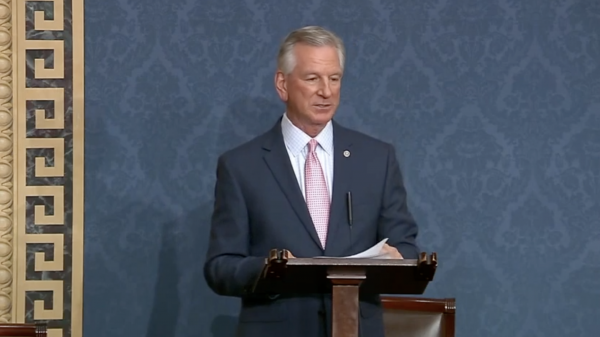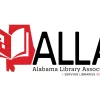A movement that began with the Prattville library is quickly expanding into a statewide issue with the Alabama Republican Party showing signs of entering the fray.
While the party didn’t take any action regarding libraries at its summer meeting on Saturday, a proposed resolution was distributed at every table calling for the Alabama Public Library Service to cut ties with the American Library Association.
That resolution was not part of the party’s packet Saturday, but National Committeeman Paul Reynolds took his time during the meeting to bring Hannah Rees and Audrey Strong before the members to speak about the situation. Rees is one of the founding members of Clean Up Prattville, the group challenging books at the Autauga-Prattville Public Library that has now become a statewide effort under the name “Clean Up Alabama.”
Rees confirmed Sunday that Reynolds drafted the resolution that appeared on the members’ tables, but it would need to go through the resolutions committee before being approved by the party. The next chance for that will be at the party’s winter dinner.
In introducing Rees and Strong, Reynolds made multiple misstatements about the Prattville situation.
For one, he told members that the Southern Poverty Law Center characterized the women (or the group) as “terrorists.” The SPLC has no label for Clean Up Prattville, but has labeled the conservative group Moms for Liberty as an extremist group. Rees said Clean Up Prattville is not part of Moms for Liberty, but has partnered with the group as well as “LOCAL” due to their shared beliefs.
He also mischaracterized what has happened at the Prattville City Council, telling members that a book in the library “for 8-year-olds” contained language “so bad the city council of Prattville wouldn’t let it be read in public.”
The Prattville City Council did make a rule change to prohibit the public from reading book excerpts due to the content being read, but those excerpts are from books meant for older teens.
Rees told ALGOP members that cutting all ties between the American Library Association and the ALPS would be an important step toward changing what content is allowed in libraries.
“This matters because APLS abides by the policies of ALA,” Rees said. “In our local libraries, their librarians are members of the ALA and have been taught and indoctrinated by ALA.”
The resolution claims that current ALA president Emily Drabinski is a “self-proclaimed” Marxist, referring to a since-deleted tweet upon her election where Drabinski expressed enthusiasm that she had won election as a “Marxist lesbian.”
The Montana Public Library Commission ultimately cut ties with the ALA after the tweet, which the resolution points to as an example for Alabama to follow.
Rees also pointed to the ALA’s opposition to the Child Internet Protection Act in the early 2000s requiring libraries to implement content-filtering technology on library computers in order to receive federal funds. The ALA opposed the bill on the basis that content filtering programs at the time were not sophisticated enough to prohibit only obscene material, but would also unconstitutionally overextend and prevent lawful speech. The Supreme Court ultimately ruled the law constitutional, ruling that internet-enabled computers at public libraries don’t constitute a traditional public forum.
The resolution does not focus on calling the material “obscene” and “pornographic,” as has sometimes been the distinction focused on by critics of the books to align with Alabama’s anti-obscenity laws. The opening paragraph of the resolution directly states that “numerous local and community libraries in Alabama have recently become a focal point for the promotion, distribution and proclaiming of personal activities (often sexual) and lifestyles that run counter to the traditional Biblical family practices of their service area.”
The resolution further states that it is “encouraging” that groups like Clean Up Alabama and LOCAL are “springing up to counter the philosophy of collectivism, i.e. communism, admittedly being espoused by the president of ALA, combined with an organized and well-funded push by the LGBTQ+ community.”
It is unclear what well-funded and organized LGBTQ+ community the resolution is referencing—there has been no indication thus far that the group pushing back in Prattville is anything more than citizens who disagree with removing or moving the challenged books—just as there have been no indications that the group challenging the books has been funded or organized outside of the natural organization of concerned citizens.
“These local groups work in the hurricane-like force of constant harassment and verbal ridicule by liberal and misguided opposition groups,” the resolution states.
Both sides have had members act out verbally—a woman protesting the challenges of the book at a library board meeting Thursday was removed after causing a scene and calling Mayor Bill Gillespie a “bigot” while getting in his face.
The library moved the first six books behind the circulation desk due to claims of “harassment” by people who opposed the books remaining in circulation.
Both sides also have members who have acted with decorum as they have debated the issue.
Although the Republican Party did not take any action on the issue at its meeting, the culture war over library book content appears to only be heating up as Saturday also brought controversy over a nationwide event by Brave Books and Kirk Cameron, with an event at the Madison County Public Library being canceled and then restored. Critics of the library said the event had been canceled due to threats of protest; the library said it canceled the event after the projected attendance ballooned from 20 attendees to more than 300. The event went on with a hard limit of 225 attendees set for the meeting room, while other attendees were directed to an overflow area.





















































